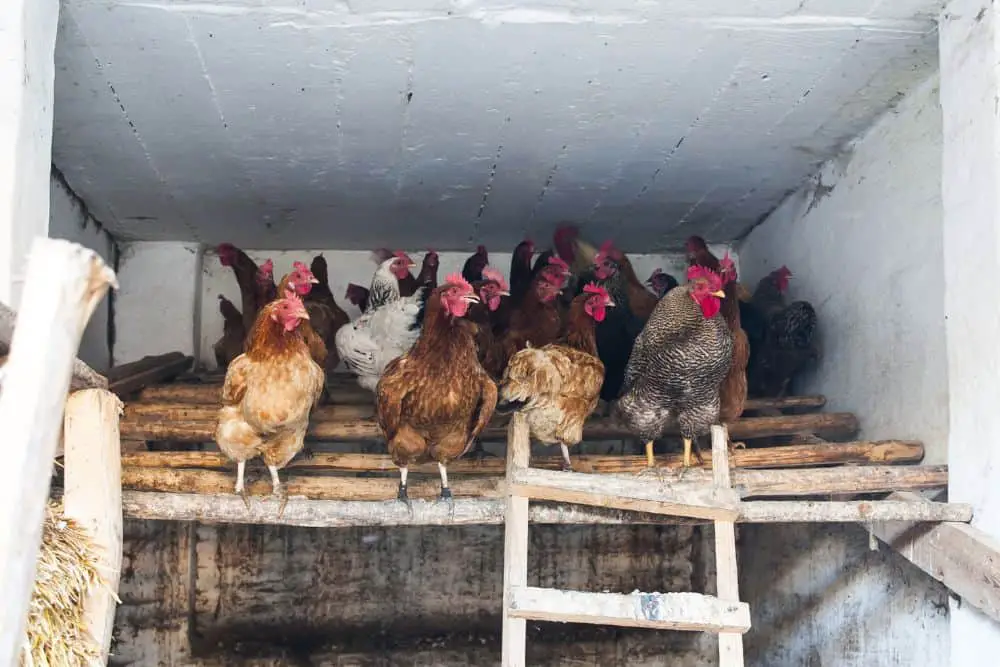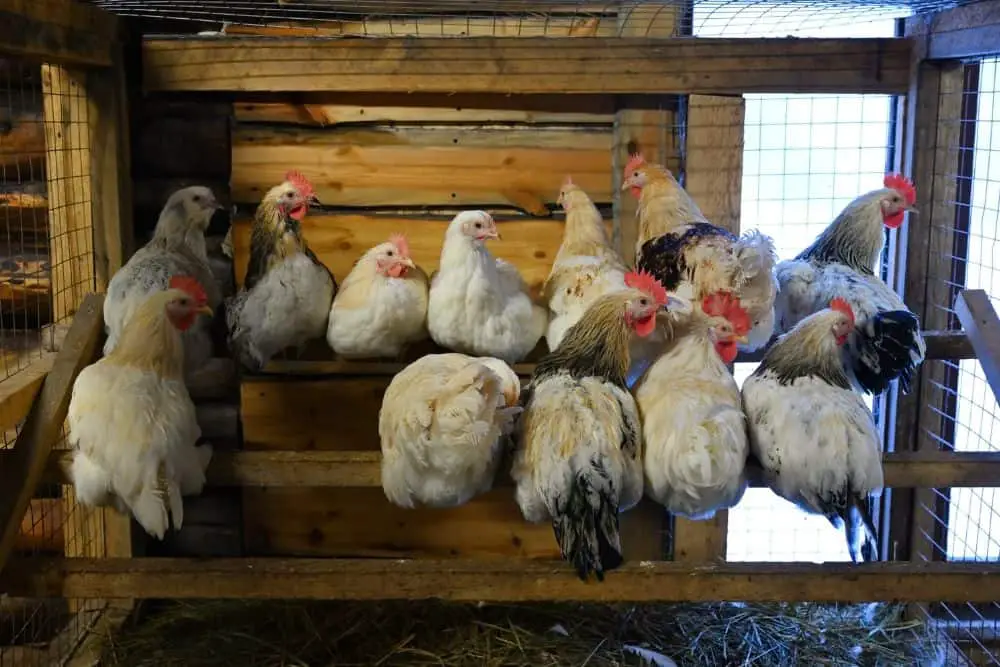For backyard chicken enthusiasts, one of the most important questions is “what time do chickens go into the coop to roost?” The answer is that they go in at dusk when the light starts to drop so that they’re not left outside in the dark. The time they go in will change each day as the days start to get shorter or longer.
How Chickens Roost
Chickens roost by perching on a high spot, usually a horizontal bar or rung on a ladder. They tuck their heads under their wing and sleep standing up. Chickens usually roost in groups, with the dominant birds getting the higher perches and the subordinate birds taking the lower perches.
Why Chickens Need to Roost
Chickens need to roost for a few different reasons. First, it’s instinctive. In the wild, chickens would roost in trees to stay safe from predators at night. Second, chickens need to roost to stay warm. When they tuck their heads under their wing, they can retain body heat better. Third, chickens need to rest so that they can lay eggs effectively. Finally, chickens like to be together, and roosting is a way for them to socialize and bond with each other.
How Do Chickens Know When to Roost?
Chickens are relatively simple creatures, but they do have some instincts that help them survive in the wild. One of those instincts is knowing when to roost. Roosting is when chickens perch on a high place inside their coop to sleep for the night. But how do they know when it’s time to roost?
Chickens have an internal body clock that tells them when it’s time to sleep. This clock is set by the amount of light that they’re exposed to. Chickens are very sensitive to light and will start to get sleepy when the sun starts to go down.
As night falls, chickens will start to head towards their coop. They know that once it gets dark, they won’t be able to find their way back to the safety of their coop. Once they’re inside, they’ll perch on a roosting bar and settle in for the night.
Chickens also have a natural desire to be in close quarters with other chickens when it’s time to sleep. This is because in the wild, sleeping in a group gives them a better chance of surviving predators. So, if you see your chickens huddled together in a corner of the coop, you’ll know it’s time for them to roost for the night.
Establish Chickens Roosting Routine
One of the best ways to ensure that your chickens are healthy and happy is to develop a routine for them. This includes establishing when and where they will sleep, what they will eat and when, and how often they will be let out to roam.
Chickens naturally like to roost in high places. This instinct goes back to their wild ancestors, who would roost in trees in order to stay away from predators. In your backyard chicken coop, you can provide them with a roosting bar made out of wood or metal. Just make sure that it is sturdy and about two inches in diameter so that they can grip it easily.
When choosing where to place the roosting bar in the coop, keep in mind that chickens like to perch high off the ground. You should also avoid placing it too close to the window, as this might make them too cold at night. Instead, put it towards the back of the coop where they will feel safe and warm.
It is also important to establish a good cleaning routine for your chicken coop. Chickens are very clean creatures and will not want to sleep in a dirty environment. Every few days, sweep out the coop and scrub down any surfaces that need it. Fresh straw or shavings should be added to the floor of the coop on a regular basis.

Chicken Roost Time in Summer or Winter
Depending on the season, your chickens will want to go to bed at different times. In winter, they may be ready as early as 4 or 5 pm, while in summer they may not be ready to roost until 9 or 10 pm. An automatic coop door is a great way to make sure your chickens are safely tucked in for the night, no matter what time it is.
Why Does the Time Change?
Chickens are most active during the day when they can peck around for food and socialize with their flock mates. As the sun starts to set, they’ll begin to look for a place to roost for the night. This is an instinctive behavior that comes from their wild ancestors, who needed to roost in trees to stay safe from predators.
Roosting also helps keep chickens warm at night. Their body’s temperature drops a few degrees while they sleep, so being close together on a roost helps them stay warm. In winter, this is especially important, as chickens can suffer from frostbite if they get too cold.
How to Determine Roosting Time
In winter, a chicken’s day will become much shorter and they’ll be ready to go into the coop as early as 4-5 pm in December. Obviously, this depends on where in the world you’re located, but the basic principle is that a chicken will be ready to roost at dusk and this actual time will range widely throughout the seasons.
You can determine when your chickens are ready to roost by observing their behaviors. They’ll start returning to the coop earlier and earlier as dusk approaches. Once they’re all inside and settled on their roosts, they’ll be quiet for the night.
If you’re unsure whether you should close up the coop for the night, err on the side of caution and do it sooner rather than later. Chickens are vulnerable when they’re asleep and predators such as raccoons or coyotes could easily kill them if given the chance.
What to Do if Chickens Don’t Come Into Roost at Dark
Chickens are creatures of habit. They like routines and they don’t like change. So, if you have a good routine you shouldn’t have any issues with your chickens returning to the coop to roost, but if you do have any problems, there could be a reason they’re not coming back.
The Coop Is Very Dirty
Chickens are clean animals and like to have a clean place to sleep. If the coop is too dirty, they’ll find somewhere else to roost for the night. The best way to deal with this issue is to keep the coop clean. You can do this by regularly cleaning it out and making sure there’s enough fresh straw or bedding.
There’s a Red Mite Infestation
Red mites are tiny parasitic creatures that live off the blood of chickens. If you think your chickens might have red mites, check for small brownish bugs on their feathers, especially around their vent area. You might also see them gathering around the chicken’s eyes, beak, and wattles.
To get rid of red mites, you’ll need to treat your chicken coop and run with an insecticide designed specifically for red mites. You’ll also need to treat your chickens with approved poultry dust or oil.
There’s a Predator Getting Into the Coop or Run
If there’s a predator getting into the coop or run, your chickens will definitely not want to go inside. The best way to deal with this problem is to make sure the coop and run are secure. This means repairing any holes or gaps and making sure the doors are securely latched. You might also want to consider installing a motion-activated light near the entrance to deter predators.
The Chickens Don’t Have the Right Places to Roost
Chickens like to roost in high places where they feel safe from predators. If there aren’t any high places for them to roost in your coop or run, they may not go inside at night. The best way to fix this problem is to add more roosting bars or perches inside the coop so the chickens have somewhere safe to sleep.
In Conclusion
So there you have it! Chickens go into the coop to roost at dusk because it’s instinctive, it helps them stay warm, it helps them lay eggs effectively, and it’s a way for them to socialize and bond with each other.
By understanding how daylight affects your chicken’s sleep patterns, you can make sure they’re safely tucked in for the night—no matter what time it is. An automatic coop door is a great way to get around the issue of closing the coop door very late or early on while you still may be working or out for the evening. With a little bit of observation, you can ensure your chickens are always happy and healthy.

